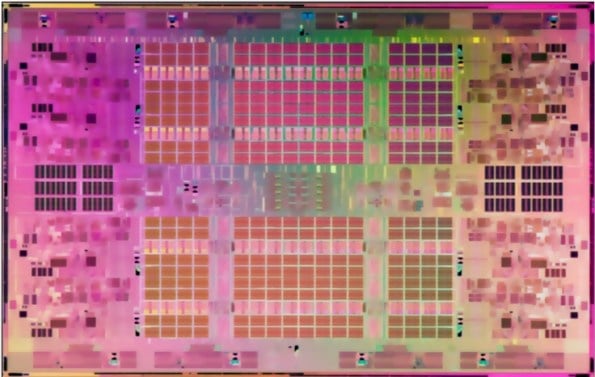HP Asks EU To Investigate Oracle's Decision To Dump Itanium
HP and Oracle have been slugging it out in court over the future of Intel's Itanium for months now. HP has just widened the front by asking the EU to investigate whether Oracle acted improperly when it terminated support for Intel's Itanium. HP claims that Oracle is improperly leveraging its software market to compel purchases of its own hardware, while Oracle maintains that Itanium is essentially a zombie chip.
Just the Facts
HP sued Oracle after the software company announced it would stop building software for Itanium. According to Bill Wohl, HP's chief communications officer, the two companies share ~140,000 customers. The lawsuit is an attempt to enforce what HP believes are contractual obligations to those customers, and because Oracle's decision is an "unlawful attempt to force customers from HP Itanium platforms."
That's where things get interesting. Having acquired Sun last year, Oracle now owns its own server business and CPU architecture. HP believes this explains Oracle's sudden interest in saving the world from Itanium. Oracle, for its part, alleges that "HP has secretly contracted with Intel to keep churning out Itaniums so that HP can maintain the appearance that a dead microprocessor is still alive."

Poulson. That's not just 54MB of L3 cache -- it's 54MB of zombie L3 cache.
Based on Oracle's filing, Intel is obligated to supply at least two future Itanium products. Right now, there are two future Itanium parts on Intel's roadmap -- Poulson and Kittson. We don't know anything about Kittson yet, but Poulson is a great deal more powerful than what you'd expect if Intel was simply running out a contractual shot clock.
Intel's current top-end Itanium, Tukwila, is a 2-4 core CPU built on a 65nm process and clocked at 1.33 - 1.73GHz. Poulson, in contrast, is an eight-core, 32nm chip capable of issuing up to 12 instructions per cycle (Tukwila tops out at six). Intel hasn't discussed clock speeds, but the new chip will offer 54MB of L3 cache compared to Tukwila's 24MB.
Santa Clara's clear commitment to increasing Itanium's performance make Oracle's allegations of zombiehood dubious at best. Furthermore, Oracle's initial claim was that Intel was pulling the plug on Itanium altogether. Now, its allegations are that Intel and HP will keep Itanium alive well past 2014, when Kittson is expected to debut.
HP's request that the EU investigate emphasizes its claim that the entire affair is little more than Oracle attempting to steal Itanium customers for itself. It's a pessimistic viewpoint, but it makes more sense than first accusing Intel and HP of plotting to pull the plug on IA-64 before reversing and arguing the opposite. The judge in the case has asked the two parties to reconcile, but that seems unlikely. HP claims sales are down thanks to oracle's accusations, while Oracle feels it has proof of fraudulent activity. We're tempted to get the two a room.
Just the Facts
HP sued Oracle after the software company announced it would stop building software for Itanium. According to Bill Wohl, HP's chief communications officer, the two companies share ~140,000 customers. The lawsuit is an attempt to enforce what HP believes are contractual obligations to those customers, and because Oracle's decision is an "unlawful attempt to force customers from HP Itanium platforms."
That's where things get interesting. Having acquired Sun last year, Oracle now owns its own server business and CPU architecture. HP believes this explains Oracle's sudden interest in saving the world from Itanium. Oracle, for its part, alleges that "HP has secretly contracted with Intel to keep churning out Itaniums so that HP can maintain the appearance that a dead microprocessor is still alive."

Poulson. That's not just 54MB of L3 cache -- it's 54MB of zombie L3 cache.
Based on Oracle's filing, Intel is obligated to supply at least two future Itanium products. Right now, there are two future Itanium parts on Intel's roadmap -- Poulson and Kittson. We don't know anything about Kittson yet, but Poulson is a great deal more powerful than what you'd expect if Intel was simply running out a contractual shot clock.
Intel's current top-end Itanium, Tukwila, is a 2-4 core CPU built on a 65nm process and clocked at 1.33 - 1.73GHz. Poulson, in contrast, is an eight-core, 32nm chip capable of issuing up to 12 instructions per cycle (Tukwila tops out at six). Intel hasn't discussed clock speeds, but the new chip will offer 54MB of L3 cache compared to Tukwila's 24MB.
Santa Clara's clear commitment to increasing Itanium's performance make Oracle's allegations of zombiehood dubious at best. Furthermore, Oracle's initial claim was that Intel was pulling the plug on Itanium altogether. Now, its allegations are that Intel and HP will keep Itanium alive well past 2014, when Kittson is expected to debut.
HP's request that the EU investigate emphasizes its claim that the entire affair is little more than Oracle attempting to steal Itanium customers for itself. It's a pessimistic viewpoint, but it makes more sense than first accusing Intel and HP of plotting to pull the plug on IA-64 before reversing and arguing the opposite. The judge in the case has asked the two parties to reconcile, but that seems unlikely. HP claims sales are down thanks to oracle's accusations, while Oracle feels it has proof of fraudulent activity. We're tempted to get the two a room.

